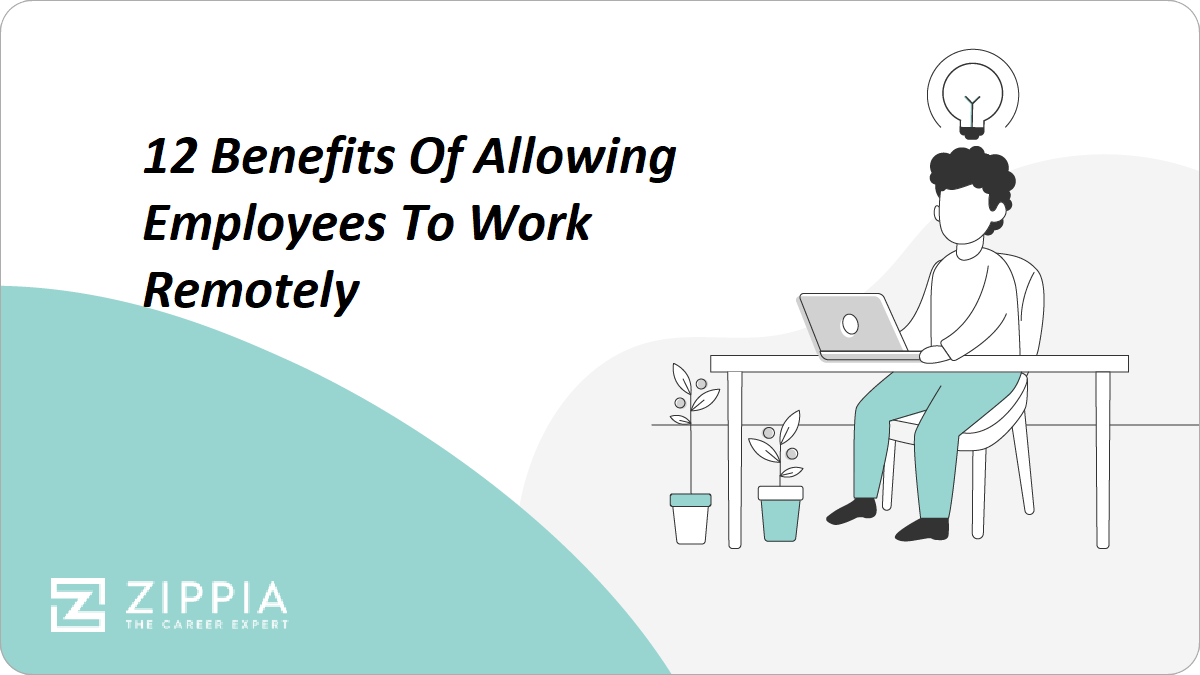We are in the midst of a flexible workplace revolution. While the benefits of working from home are immediately clear for employees, namely avoiding the daily commute and working to a schedule that suits them, the advantages for employers are not always quite so obvious.
So how could you benefit from a more flexible approach that gives your employees the freedom to work from home? These are a few of the most compelling reasons why adopting flexible working practices could boost your small business.
Key Takeaways:
-
Remote work improves employee retention and increases productivity by 13 percent.
-
The reduced need for office space is an opportunity to significantly reduce costs.
-
Hiring remote workers gives you access to a much greater recruitment pool made up of people who are outside of commuting distance.
-
Remote works allows for a more flexible schedule for employees which increases work-life balance and reduces the amount of days they miss.

Benefits Of Remote Work
To help your company decide if remote is the best option for you, here are some benefits for employers, as well as employees.
Benefits for Employers
-
Less time spent commuting. A reduction in the amount of time spent on a stressful and unpleasant commute is undoubtedly a benefit for employees, but it could also give your business a boost too.
The health and wellbeing of your workforce has proven links to productivity and a reduction in absenteeism. Whether it’s an hour and a half train ride or a 30-minute drive through rush hour traffic, this is time they’ll never get back. When working from home, an employee arrives fresh at their desk and raring to go.
Working from home also reduces their travelling costs, which means your employees can spend more of their money of the things they love. The result is a happier, healthier and more motivated workforce.
-
Improved employee retention Employee retention is important for companies of all sizes. Having employees stay for longer means they become more loyal and valuable to the company. Supporting remote work is a great way to improve employee retention.
Home working can give parents with childcare responsibilities the flexibility they need, while other workers can benefit from an enhanced work-life balance. Both of these factors play a crucial part in employee retention.
-
Access to a wider pool of applicants. One of the key drivers behind the rise in remote working is the ‘millennial effect’. Younger generations have grown up being able to communicate cheaply and effectively from anywhere in the world, so it follows that they expect the same in a workplace environment.
For younger employees, workplace flexibility is one of many factors they consider when looking for a new role. Numerous surveys have indicated that this it is something that they want and expect. Offering this type of benefit can help employers attract the young, highly skilled employees that might not otherwise be interested in a role.
Giving employees the ability to work remotely also allows you to hire outside of normal commuting distance. This can be particularly beneficial in locations or professions with skills shortages, as businesses can widen their nets and work with the most talented individuals, regardless of where they’re based.
-
More autonomous employees. Giving your employees the ability to work from home allows them to operate in a way that suits them. People can be very particular about how and when they like to work. In an office environment, all employees must adapt to the same approach. However, at home, they have much more control.
Some workers will subscribe to the tidy office, tidy mind mantra, and need to create a serene, spotless environment to be able to perform at their best. Other workers, perhaps those with a more creative bent, might do their best work curled up on the sofa or even late at night.
Of course, you will need to put certain rules in place, but within those guidelines, your team will have the freedom to create an environment and a schedule that allows them to perform at their best.
-
Lower costs. office space’s can be expensive. If you rent office space then you can claim some of the costs back as part of your capital allowance, but it’s still likely to be one of the biggest fixed costs your business will have.
Completly remote work might not be an option for all companies but by allowing your employees to work from home two days a week and operating a hot-desking policy the rest of the time, you could reduce the amount of office space you need. It’s true that hot-desking is not every employee’s favorite policy, but if it gives them the freedom to work from home for part of the week then there’s a good chance it will work.
-
Make better use of technology. Working from home would be impossible without the fantastic technology we have today. Technology is the key enabler of mobility, with fast Wi-Fi connections, smartphones, cloud computing, instant messaging, project management software and VoIP allowing colleagues to communicate and collaborate instantaneously.
The temptation might be to think that a remote workforce is a disparate workforce, but given these invaluable tools, these days that’s simply not the case. As well as putting the necessary technology in place, there are also a number of other steps you can take to give your home working arrangement the very best chance of success.
-
Reduced salaries. Not all employees will be happy to take a pay cut in return for more flexible workplace practices, however research has shown that 36 percent of employees would choose the ability to work from home over a pay rise.
That means that rather than seeking a pay increase for their good performance, employees could be rewarded by having the flexibility to work from home. Not only will this help to keep your wage bill down but it will also improve the level of cash-flow in your business so you can take advantage of more of the opportunities that come along.
-
Increased productivity. A lot of employees are already bringing work home with them and getting it done without someone supervising them. When workers are skipping a long commute and they don’t have all the office distractions, they tend to be more productive in their work.
Remote work often leads to a better work-life balance which increases employee happiness and health which increase their productivity. It also allows them to choose the time of day that they are most productive.
-
Better work-life balance. Remote work often allows for a more flexible schedule. If an employee is the primary family caregiver, working later in the day may be better for them. If they are able to spend more time with their family, they will be happier and more focused on their work. Having control over your schedule makes having a personal life easier to maintain.
-
Lower cost of living. While some workers are taking a pay cut to work from home, they are making up that cost by having a lower cost of living. They no longer are forced to work closer to the office, which may be more expensive. They have the option to live somewhere cheaper, making the stress of financial budgeting easier.
Not only are they saving money on where they live, but they are often saving money on gas and work clothing expenses. When employees are able to save money more, they are less likely to need a second or third job, which will shift all their focus and energy back to your company.
-
Reduced absenteeism. Working from home reduces the amount that an employee calls out. If there is an illness in the family, or the employee is sick, they don’t have to worry about calling out of work to take care of themselves or the family member. The employee won’t miss out on the hours that might be missed, and the company won’t miss out on their productivity and profit for the day.
-
Less office politics. Working in the office means there are office politics and office gossip to worry about. While it’s impossible to completely reduce office gossip and politics, remote workers are able to skip over it easier than they would in a traditional office setting.
Remote work relies on great communication through email and over video chat, which helps reduce the risk of misunderstanding because there is a digital trace to the instructions given.
Benefits For Employees:
Here are some benefits that employees might experience from a remote work life:
Disadvantages of Remote Work
It’s important to consider both the pros and cons of remote work. Here are some disadvantages that both employee and employer may experience from remote work:
-
Distractions at home. There can be many distractions that detract from an employees focus. Some of those could include caring for children or family members, household chores, TV and phone distractions. When employees work from home, it’s important that they have a dedicated work area to avoid some of these distractions.
-
Increased need for meetings. Since workers are not together in the office, there will be a need for more meetings and communications. Managers and leaders will no longer be able to walk to their employees desks to see how their work is going. Virtual meetings can often be less disruptive than in-person meetings but they are usually not the highlight of the day.
-
Unreliable or inconsistent internet access. No one’s internet is going to be completely stable all the time, and there may even be issues in the office at times, but home internet sometimes can be more unreliable at times. In crowded areas such as apartment complexes or packed cities there can be a chance for slow speeds, buffering, and poor audio.
-
Isolation. Remote work, especially for workers who live alone, can cause feelings of isolation and loneliness. When working in the office, no one is truly alone, even if they have their own office. Remote workers miss out on the little interactions of everyday life that a in-person worker would experience.
-
Inconvenient for new hires. Starting a new job can be stressful for anyone, especially when you won’t physically be in the office. They will have to navigate their new technology and programs on their own. This will result in managers needing to spend more time with them coaching them on company policies and expectations.
Final Thoughts
Embracing flexible working practices does not mean shutting up shop so staff can work remotely five days a week. This is not an all-or-nothing proposition. In the vast majority of cases, the most productive solution for business owners and employees is to split time between home and the workplace. If you do, these benefits show that’s it’s not just the employees who will reap the rewards.





